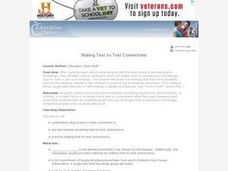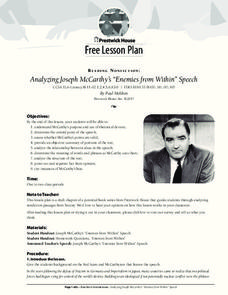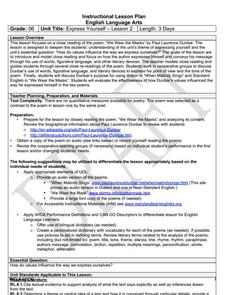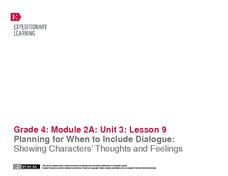Curated OER
Only the Facts
Practice the strategy of summarizing to gain meaning and knowledge from an informational text. Young readers highlight supporting details and main ideas, and then they use this to summarize two articles: "The Great Quake" and "What is an...
Curated OER
Is It Fact or Opinion?
Distinguish between fact and opinions in this nonfiction reading lesson. Middle schoolers read 'The Diary of an Early American Boy' and work in groups to analyze the text. They record the facts and opinions for the text.
Curated OER
Strong Convictions
How can the rhetorical structure of an editorial help to develop its argument? Use this New York Times editorial to emphasize the importance of structure in a piece of informational text. Adolescent writers then use the editorial as a...
Curated OER
Water Cycle Reading and Writing
Here is a great way to get pupils to express a scientific concept in a fun way. After hearing the story of Walter the Water drop and learning facts about the water cycle, the class will write a creative expository piece describing what...
Curated OER
Presenting Information
How do you make a pizza? Scholars examine a recipe for one of their favorite dishes. After reading the eight steps, they must re-write the steps in order. Although this offers great printing practice, younger writers may find the narrow...
Curated OER
Generation TeXt
Students write sentences using different writing styles. Through peer editing, they hone their writing to create effective thesis statements. They create a glossary of text messaging terms.
Curated OER
Making Text-to-Text Connections
Model for your class how to make text-to-text connections by following the script presented by this resource. No specific texts are offered as examples.
Curated OER
Farewell to Manzanar
Examine human resilience across two texts with a detailed unit. Over the course of a week, learners will conduct a close reading of excerpts from Unbroken and Farewell to Manzanar. The resource includes clear procedures for reading and...
Novelinks
Man's Search for Meaning: ReQuest Procedure Questioning Strategy
As part of a study of Viktor Frankl's Man's Search for Meaning, class members respond to, and craft, higher-level comprehension questions based on passages from the text.
Utah Education Network (UEN)
Evaluating the Format of Informational Text
Make your learners aware of the advantages and disadvantages of using different media in presentations. This straightforward resource evaluates media formations such as print, digital text, and videos. Although the subject of ballet is...
Ohio Literacy Resource Center
Compare & Contrast Essay
Comparing two texts can build a greater understanding of the texts and themes of the works. Take some time to follow the steps here to guide your pupils through the process of composing compare-and-contrast essays.
For the Teachers
Sequence Plot Chart
Your kids can identify the plot sequence of a short story, but what about an informational article? Have them examine the chronological order of events in informational texts with a lesson on the sequence of events.
Curated OER
Short and Sweet Science
Readers learn how to summarize scientific text and evaluate the advantages, disadvantages, and challenges in writing summaries. They select science-related articles you've pulled and collected from the New York Times and, with a partner,...
Curated OER
Who Could Have Been Who
Can word choice affect a candidate's likeability? Use a New York Times lesson to explore how a presidential candidate's likeability factor can fluctuate in public opinion polls. Young readers choose a presidential election from their...
Curated OER
Active Reading with American History
Explore connections within and between informational texts with this lesson about encyclopedia articles. Middle schoolers write encyclopedia articles focusing on topics in American history. They discuss how to determine credibility...
Curated OER
Word Up!
Study the importance of word choice in informational text. Middle and high schoolers locate unfamiliar words and phrases in newspaper articles of their choosing, and use online word sites to explore the definitions and histories of each....
Curated OER
What a Relief!
How are disasters addressed by the Federal Government? This New York Times lesson plan, based on the article "Disaster Aid: The Mix of Mercy and Politics," prompts middle schoolers to discuss the idea of using a disaster declaration as a...
Curated OER
Man's Search for Meaning: Vocabulary Strategy
Readers of Man's Search for Meaning use context clues, create stories using words from the text, and retype these stories as part of their vocabulary study of Viktor Frankl's book.
Prestwick House
Reading Nonfiction: Analyzing Joseph McCarthy's "Enemies from Within" Speech
Looking for a activity that teaches class members how to analyze nonfiction? Use Joseph McCarthy's famous "Enemies from Within" speech as a instructional text. Worksheet questions direct readers' attention to the many historical...
Curated OER
6th Grade: Express Yourself, Lesson 2: Close Read
The second instructional activity of a pair about Paul Laurence Dunbar, this plan focuses in particular on his poem, "We Wear the Masks." After a short historical introduction, class members conduct a series or readings, marking up the...
Houghton Mifflin Harcourt
Nature: Friend and Foe: Extra Support Lessons (Theme 6)
Breaking down words into syllables has two benefits: it improves vocabulary and it improves understanding of a text. The third and final resource in a series of materials designed to be used with Nature: Friend or Foe offers extra...
EngageNY
Reviewing Conventions and Editing Peers’ Work
Encourage young writers to edit text based on conventions. After reviewing the conventions, fourth graders watch a teacher demonstrate how to revise a paragraph for correct spelling, capitalization, punctuation, or dialogue. Then, pairs...
EngageNY
Revising for Organization and Style: Exciting Endings
Young writers compose a gripping ending to their historical fiction narratives. Following the previous lesson plan, where learners wrote a bold beginning, class members examine exciting endings from a literary text. They then draft their...
EngageNY
Planning for When to Include Dialogue: Showing Characters’ Thoughts and Feelings
Young writers examine dialogue conventions, including indentation, quotation marks, and expressing thoughts and feelings through a fictional text. By noticing where and when authors use dialogue, they decide how to incorporate dialogue...
Other popular searches
- Procedural Text Activities
- Procedural Text Examples
- Procedural Text Reading
- Procedural Text Grade 3
- Procedural Text Writing
- Procedural Text Lesson
- Lesson Plan Procedural Text
- Procedural Text Assessment
- Procedural Text Recipes
- Lesson Procedural Texts
- Easy Procedural Texts
- Procedural Text Kindegarten

























